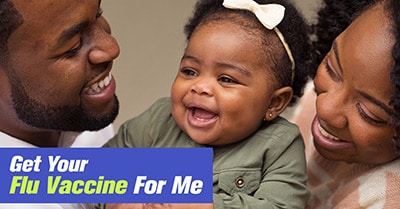Leaving No Stone Unturned: Southern Nevada Health District
The COVID-19 pandemic is revealing many heroes in public health dedicated to keeping Americans safe from disease and saving lives.
The Southern Nevada Health District’s (SNHD) Office of Chronic Disease Prevention and Health Promotion is a CDC partner doing heroic work when it comes to reducing disparities in adult immunization. SNHD is located in Las Vegas, Nevada and serves 2.3 million people, which is over 75% of the state’s population. In April 2021, SNHD began a COVID-19/Flu project with partner organizations, funded via the Racial and Ethnic Approaches to Community Health (REACH) initiative. The goal is to increase vaccine equity by reaching project priority populations of African American adults and Hispanic adults.
SNHD worked with The Nevada Institute for Children’s Research (NICRP) to conduct a needs assessment. NICRP developed a map overlaying a social vulnerability index with rates of completed vaccines in Clark County, where Las Vegas is located. This showed the zip codes and populations with the lowest vaccination rates, which NICRP staff used to determine priority locations to conduct a COVID-19 and Flu Vaccination Survey in September 2021. Survey responses were collected from priority populations (98 African American and 87 Hispanic survey respondents).
NICRP then put together a focus group with young African American/Non-Hispanic Black adults (ages 18 to 35) because this group represented those most at risk of being newly infected with COVID-19 at that time. The focus group built upon the findings of the COVID-19 and Flu Vaccination Survey to better understand disparities in vaccine uptake. Here are some key findings from the focus group:
COVID-19
Among those who accepted COVID-19 vaccines, focus group participants shared the following reasons:
- Protecting the health of themselves and others
- Having been directly impacted by COVID-19
- Resuming life and getting back to normal
- Viewing access to vaccines as a privilege
- Being able to visit family members who are vulnerable to contracting COVID-19
Among those who delayed obtaining COVID-19 vaccines, focus group participants shared the following reasons:
- Did not view it as a high priority
- Planned to get vaccinated, just not right now
- Did not view the vaccine as a solution to the problems revealed by the pandemic
- Had low access to health care
Among those who refused the COVID-19 vaccine, focus group participants shared the following reasons:
- Afraid of long-term vaccine side effects
- Had preexisting health conditions
- Followed the advice of a health care provider*
Flu
Many focus group participants reported accepting the flu vaccine simply because it was offered to them when obtaining COVID-19 vaccines. Other motivators for accepting the vaccine included:
- Protecting their health
- Following work requirements
- Routine
Participants shared several reasons for flu vaccine hesitancy, which included:
- Fear of side effects
- Past experiences with side effects
- Not viewing flu vaccines as routine or normal in their family
- Not viewing flu vaccines as necessary
- Never occurred to them to get a flu vaccine
SNHD used the information gathered in the needs assessment to train 230 community-level spokespersons to combat misinformation and support vaccine uptake among Clark County residents. These spokespersons included community health workers, faith and cultural leaders, barbers, beauticians, business owners, radio DJs, and other public figures. The COVID-19/Flu project continued with the implementation of 11 media campaigns between April 2021 and September 2022 that generated over 28 million TV, online, and radio ad impressions. SNHD also worked with communities and stakeholders to strengthen 131 provider partnerships and participated in 58 community events with more than 19,000 attendees to promote and increase access to COVID-19 and flu vaccination. SNHD also worked with vaccination partner Immunize Nevada to organize 147 mobile pop-up clinics to serve hard-to-reach people.

SNHD remains committed to achieving vaccine equity. Maria Azzarelli, Manager of Chronic Disease Prevention and Health Promotion for SNHD believes one of the key lessons from the COVID-19 pandemic is keeping relationships strong in the community so that when health emergencies happen in the future, a strong trust has been built. “Developing relationships in areas of highest need is so important in advance of anything happening. We need to work on those relationships to tackle many other public health issues, and not wait for the next pandemic to come.” She also believes COVID-19 brought inequity to light: “we need to utilize the momentum to build upon the gains in vaccine equity during this pandemic.”
Read more about the work of SNHD to serve the community of southern Nevada on the Partnering for Vaccine Equity "Stories from the Field" page.
*Note: With the exception of very rare cases where an individual has a contraindication for COVID-19 vaccination (such as a severe allergy to one of the vaccine ingredients), CDC recommends COVID-19 vaccination for everyone ages 6 months and older. For more information, see: Clinical Guidance for COVID-19 Vaccination | CDC
Federal funding for this project is supported through cooperative agreement 1 NH23IP922652-01-00 from the Centers for Disease Control and Prevention (CDC) of the U.S. Department of Health and Human Services (HHS) totaling $25,660,048 with 100 percent funding from CDC/HHS. The contents are those of the author(s) and do not necessarily represent the official views of, nor an endorsement, by CDC/HHS, or the U.S. Government.
